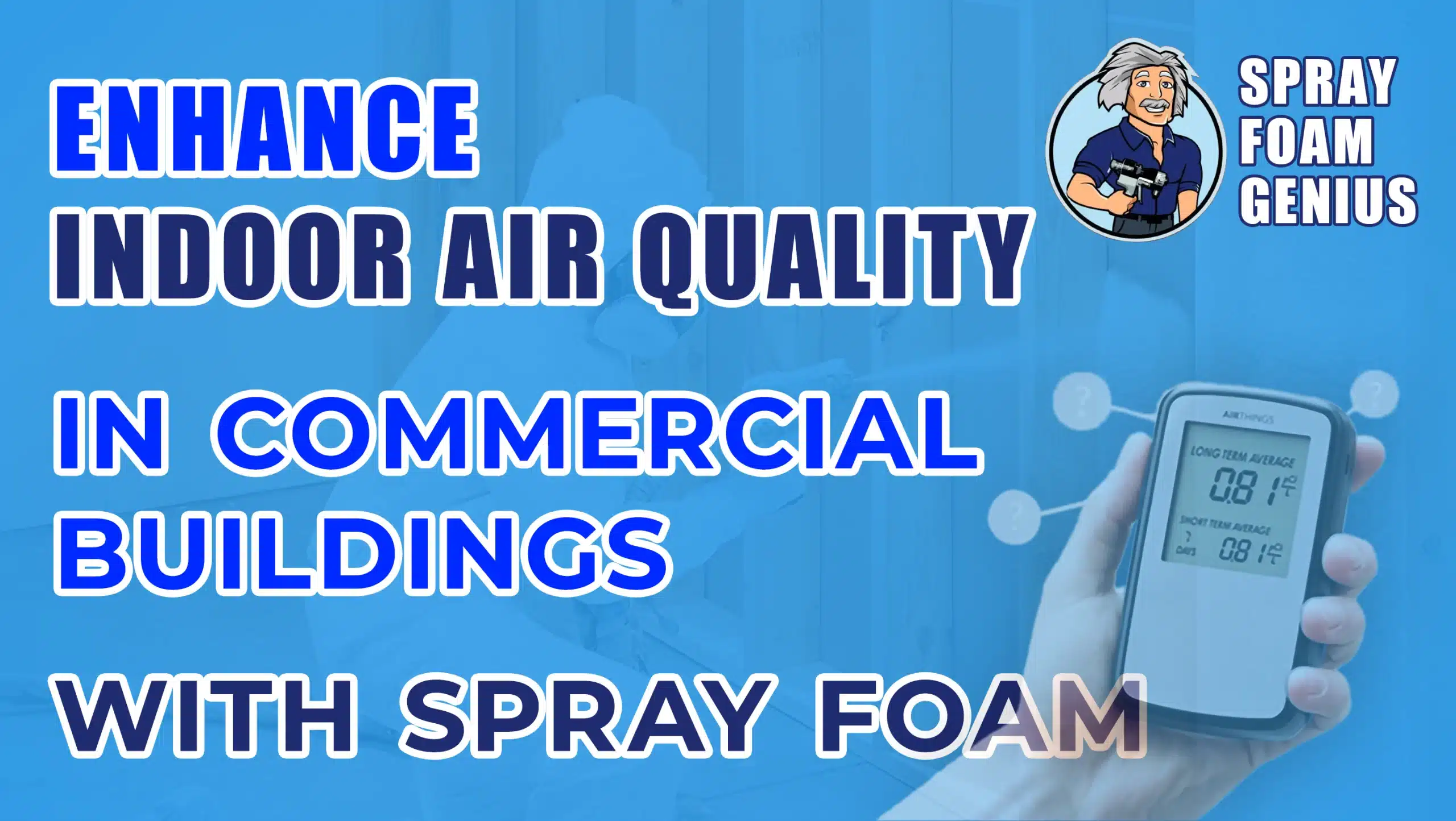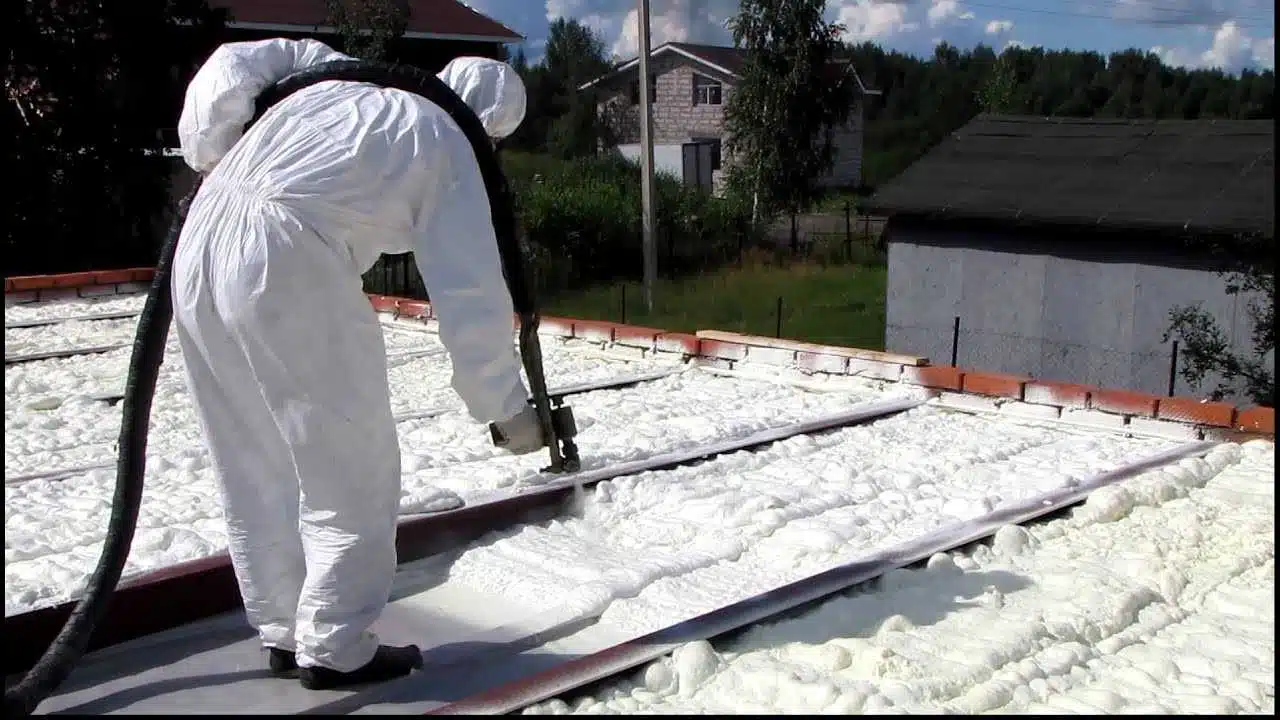
As the demand for healthier work environments grows, indoor air quality (IAQ) has become a critical concern for commercial buildings. Poor air quality can lead to various health problems, reduced employee productivity, and even potential legal liabilities for business owners. For spray foam contractors in the USA and Canada, offering solutions that not only enhance energy efficiency but also improve IAQ can set your business apart in the competitive market. Spray foam insulation is one such solution, providing a robust barrier against airborne pollutants, allergens, and moisture. This post delves into how spray foam insulation can significantly improve indoor air quality in commercial buildings, aligning with the latest industry standards and environmental guidelines.
Understanding Indoor Air Quality in Commercial Buildings
What is Indoor Air Quality (IAQ)?
Indoor air quality refers to the condition of the air inside buildings, including the presence of pollutants, humidity levels, and ventilation efficiency. Poor IAQ can be caused by a variety of factors such as inadequate ventilation, chemical contaminants from indoor sources, outdoor pollutants, and microbial contaminants like mold.
Common IAQ Issues in Commercial Buildings
- Pollutants: These include volatile organic compounds (VOCs), dust, and other particulates that can circulate within a building, often exacerbated by poor ventilation systems.
- Humidity and Moisture: High humidity levels can lead to mold growth, which releases spores into the air, negatively impacting health.
- Temperature Fluctuations: Inconsistent temperatures can lead to discomfort and stress, indirectly affecting IAQ.
- Poor Ventilation: Insufficient ventilation can trap pollutants inside, leading to a build-up of harmful contaminants.
How Spray Foam Insulation Improves Indoor Air Quality
1. Air Sealing Capabilities
One of the most significant benefits of spray foam insulation is its ability to create an airtight seal. Unlike traditional insulation methods, spray foam expands to fill gaps, cracks, and crevices, effectively preventing the infiltration of outdoor pollutants, allergens, and moisture. This comprehensive air seal reduces the entry of:
- Dust and Particulates: Keeping airborne particles out helps maintain cleaner indoor air.
- Pollen and Allergens: Reducing allergens improves the environment for individuals with allergies or asthma.
- Pollutants and Chemicals: Prevents the intrusion of external pollutants, enhancing overall air quality.
2. Moisture Control and Mold Prevention
Moisture is a primary contributor to poor indoor air quality. High levels of humidity can encourage mold growth, which can release spores and mycotoxins into the air. Spray foam insulation’s moisture-resistant properties make it a superior choice for controlling indoor humidity levels. By preventing condensation and mold formation, spray foam insulation helps:
- Reduce Health Risks: Mold exposure can cause respiratory issues, allergic reactions, and other health problems.
- Improve Structural Integrity: Keeping moisture out also prevents the deterioration of building materials, reducing the need for costly repairs.
3. Reduction of Volatile Organic Compounds (VOCs)
Many building materials release VOCs, which can degrade air quality and pose health risks. Spray foam insulation, especially low-VOC formulas, helps reduce the concentration of these compounds in the air. This is particularly beneficial in:
- New Constructions and Renovations: Where building materials often emit higher levels of VOCs.
- Work Environments: Enhancing employee well-being and productivity by reducing exposure to harmful chemicals.
4. Enhanced Thermal Performance
Maintaining a stable indoor temperature is crucial for comfort and air quality. Spray foam insulation provides excellent thermal performance, which:
- Minimizes Temperature Fluctuations: Consistent temperatures reduce the strain on HVAC systems, which can otherwise circulate dust and other pollutants.
- Increases Energy Efficiency: Lower energy use not only reduces costs but also lessens the building’s environmental footprint, contributing to a healthier indoor environment.
Environmental Impact of Spray Foam Insulation

1. Energy Efficiency and Reduced Carbon Footprint
Spray foam insulation’s superior air sealing and thermal properties significantly reduce energy consumption in commercial buildings. This leads to:
- Lower HVAC Loads: Efficient insulation reduces the workload on heating and cooling systems, which in turn lowers energy consumption and greenhouse gas emissions.
- Sustainability: Many spray foam products are now made with environmentally friendly blowing agents and recycled materials, further enhancing their green credentials.
2. Contribution to LEED and Green Building Certifications
For commercial building owners aiming to achieve LEED or other green building certifications, spray foam insulation can contribute points in several categories, including:
- Energy and Atmosphere: For optimizing energy performance.
- Indoor Environmental Quality: Due to its air sealing and moisture control capabilities.
3. Long-Term Durability and Reduced Waste
Spray foam insulation is durable and long-lasting, reducing the need for frequent replacements. This longevity minimizes waste and the environmental impact associated with the production and disposal of insulation materials.
Case Studies: Real-World Impact of Spray Foam Insulation on IAQ
Case Study 1: Office Building in New York
A commercial office building in New York faced recurring complaints about air quality, with employees reporting frequent allergies and respiratory issues. By replacing the existing fiberglass insulation with spray foam, the building saw:
- Immediate Reduction in Airborne Allergens: Dust and pollen levels dropped significantly.
- Improved Humidity Control: Mold growth was eliminated, enhancing overall air quality.
- Energy Savings: HVAC usage decreased by 30%, further improving air quality by reducing the circulation of particulates.
Case Study 2: Retail Space in Toronto
A retail space in Toronto struggled with fluctuating temperatures and high energy costs, contributing to poor air quality and customer discomfort. After installing spray foam insulation:
- Temperature Stabilized: Leading to more consistent comfort levels and reduced strain on HVAC systems.
- VOC Levels Dropped: The use of low-VOC spray foam insulation improved indoor air quality, creating a healthier shopping environment.
Best Practices for Spray Foam Contractors
1. Educate Clients on the Benefits
When discussing insulation options with commercial building owners, emphasize how spray foam insulation can enhance indoor air quality. Highlight the following points:
- Health Benefits: Reduced allergens, mold prevention, and fewer VOCs.
- Cost Savings: Lower energy bills and reduced maintenance costs over time.
2. Use High-Quality, Low-VOC Spray Foam Products
Select products that are specifically designed to improve IAQ. Low-VOC spray foam options are better for both the environment and the health of building occupants.
3. Proper Installation Techniques
Proper installation is key to maximizing the benefits of spray foam insulation. Ensure your team is well-trained and follows best practices, including:
- Sealing All Gaps and Crevices: To create a comprehensive barrier against pollutants.
- Monitoring Application Thickness: To achieve the desired R-value and prevent issues like off-gassing.
4. Stay Updated on Industry Standards and Certifications
Keep abreast of the latest standards in insulation and IAQ. Certifications such as GREENGUARD can serve as a mark of quality and trustworthiness for your services.
Take Action: Improve Your Clients’ Indoor Air Quality with Spray Foam Insulation
As spray foam contractors, you have the opportunity to provide more than just energy efficiency. By promoting spray foam insulation’s ability to enhance indoor air quality, you can position your business as a leader in creating healthier, more comfortable commercial spaces. Whether you’re working on new constructions or retrofitting existing buildings, the benefits of spray foam insulation are clear.
Are you ready to offer your clients improved air quality and energy savings? Call us at 877-840-FOAM for USA and 844-741-FOAM for Canada visit our website at sprayfoamgeniusmarketing.com, or email us at [email protected] to learn more about how we can help you grow your spray foam insulation business.
- 5 Google My Business Hacks to Double Your Leads for Spray Foam Insulation Contractors - January 14, 2025
- Why Spray Foam Contractors Cannot Ignore Reputation Management in 2025 - January 13, 2025
- Local SEO Secrets Every Spray Foam Contractor Must Know to Win in 2025 - January 13, 2025

